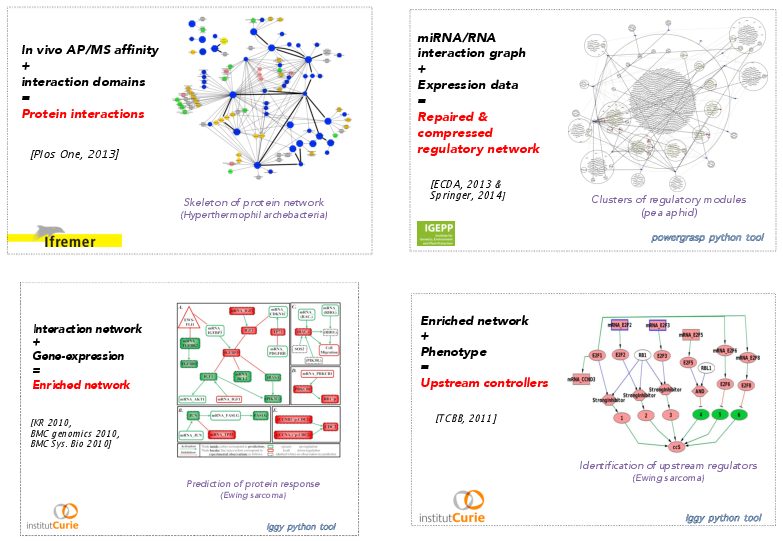Section: Research Program
Modeling knowledge integration with combinatorial constraints
Biological networks are built with data-driven approaches aiming at translating genomic information into a functional map. Most methods are based on a probabilistic framework which defines a probability distribution over the set of models. The reconstructed network is then defined as the most likely model given the data.
Our team has investigated an alternative perspective where each data induces a set of constraints - related to the steady state response of the system dynamics - on the set of possible values in a network of fixed topology. The methods that we have developed complete the network with product states at the level of nodes and influence types at the level of edges, able to globally explain experimental data. In other words, the selection of relevant information in the model is no more performed by selecting the network with the highest score, but rather by exploring the complete space of models satisfying constraints on the possible dynamics supported by prior knowledge and observations. In the (common) case when there is no model satisfying all the constraints, we relax the problem by introducing new combinatorial optimization problems that introduce the possibility of correcting the data or the knowledge. Common properties to all solutions are considered as a robust information about the system, as they are independent from the choice of a single solution to the optimization problem [6].
Solving these computational issues requires addressing NP-hard qualitative (non-temporal) issues. We have developed a long-term collaboration with Potsdam University in order to use a logical paradigm named Answer Set Programming (ASP) [50], [69] to solve these constraint satisfiability and combinatorial optimization issues. Applied on transcriptomic or cancer networks, our methods identified which regions of a large-scale network shall be corrected [51], and proposed robust corrections [5]. This result suggested that this approach was compatible with efficiency, scale and expressivity needed by biological systems.
During the last years, our goal was to provide formal models of queries on biological networks with the focus of integrating dynamical information as explicit logical constraints in the modeling process. Using these technologies requires to revisit and reformulate constraint-satisfiability problems at hand in order both to decrease the search space size in the grounding part of the process and to improve the exploration of this search space in the solving part of the process. Concretely, getting logical encoding for the optimization problems forces to clarify the roles and dependencies between parameters involved in the problem. This paves the way to a refinement approach based on a fine investigation of the space of hypotheses in order to make it smaller and gain in the understanding of the system. Our studies confirmed that logical paradigms are a powerful approach to build and query reconstructed biological systems, in complement to discriminative ("black-box") approaches based on statistical machine-learning. Based on these technologies, we have developed a panel of methods allowing the integration of muli-scale data knowledge, linking genomics, metabolomics, expression data and protein measurement of several phenotypes (see Fig. 1).
|
Notice that our main issue is in the field of knowledge representation. More precisely, we do not wish to develop new solvers or grounders, a self-contained computational issue which is addressed by specialized teams such as our collaborator team in Potsdam. Our goal is rather to investigate how the constant progresses in the field of constraint logical programming, shown by the performance of ASP-solvers, are sufficient to address the complexity of constraint-satisfiability and combinatorial optimization issues explored in systems biology. In this direction, we work in close interaction with Potsdam university to feed their research activities which challenging issues from bioinformatics and, as a feed-back, take benefit of the prototypes they develop.
By exploring the complete space of models, our approach typically produces numerous candidate models compatible with the observations. We began investigating to what extent domain knowledge can further refine the analysis of the set of models by identifying classes of similar models, or by selecting a subset of models that satify an additional constraint (for instance, best fit with a set of experiments, or with a minimal size). We anticipate that this will be particularly relevant when studying non-model species for which little is known but valuable information from other species can be transposed or adapted. These efforts consist in developing reasoning methods based on ontologies as formal representation of symbolic knowledge. We use Semantic Web tools such as SPARQL for querying and integrating large sources of external knowledge, and measures of semantic similarity and particularity for analyzing data.



